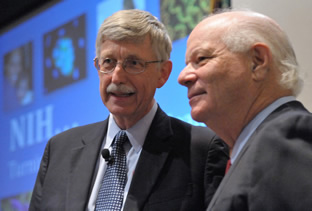 |
|
 |
‘You Are Our Heroes’
At Town Meeting, U.S. Senator Offers Encouragement |
| By Carla Garnett |
 |
| NIH director Dr. Francis Collins (l) welcomes U.S. Sen. Ben Cardin (D-MD) at a town meeting. |
Even the most casual observer might notice that federal workers—perhaps NIH’ers in particular—aren’t exactly feeling the love these days. So it was natural for a long-time close friend of public servants, Sen. Ben Cardin (D-MD), not only to take notice but also to take action. He visited NIH Aug. 31 to deliver a strong message at a town hall meeting in Masur Auditorium.
“The main reason I wanted to come here, particularly at this moment, is to say thank you,” Cardin said. “I know Congress has a strange way of saying thank you. I know at times you sorta wonder whether we’re on the same side or not. But I really mean this. Thank you for being on the front lines. Thank you for your public service. Thank you for putting up with a lot of abuse that we hear every day in the news media. You do this because you’re making a huge difference for the people in our community and the people of our country and world. I’m here to say thank you as a grateful member of Congress. The work you do is so critically important…You do your work the best in the world.”
more…
|
|
|
|
Knaul Urges World To Close the Cancer Divide |
| By Susan Johnson |
|
Quick: What are some of the diseases that most affect the world’s poor?
Did HIV/AIDS, malaria or cholera come to mind? What about cervical cancer? It’s likely that this disease was not near the top of—or even on—your list, even though more than 90 percent of deaths from this cancer occur in low- and middle-income nations. In fact, two-thirds of all cancer deaths in the world are in low-income countries and 80 percent of all avoidable cancer deaths occur in low- and middle-income countries.
Dr. Felicia Knaul, keynote speaker at the Cancer Detection and Diagnostics Technologies for Global Health conference on Aug. 22-23, spoke about some of these misconceptions concerning cancer and the poor and argued that prevention and treatment of cancers in developing nations should be a global health priority. Knaul is director of the Harvard Global Equity Initiative and the secretariat to the Global Task Force on Expanded Access to Cancer Care and Control in Developing Countries. Since 2007, she has also endured 16 rounds of chemotherapy and 10 surgeries to treat her stage 2 breast cancer.
more…
|
|
|
|
|
 |

